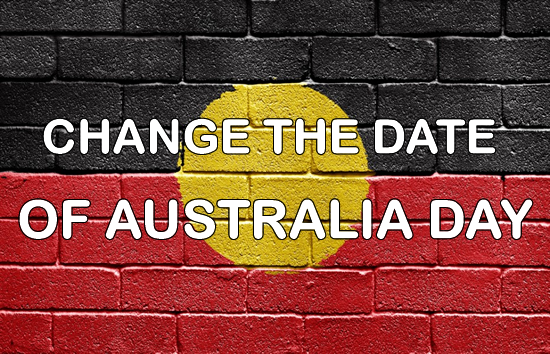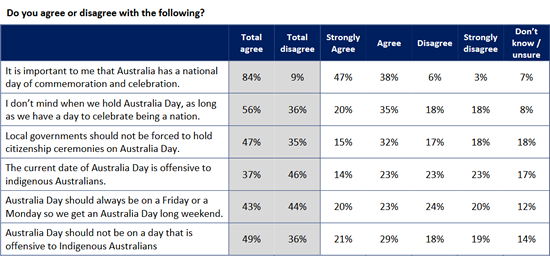
For as long as I can recall there has been a division in the Australian community over having Australia’s national day of celebration on the anniversary of Captain Arthur Phillip R.N. being rowed ashore in Sydney Cove amid a gale on the 26th January, 1788. Upon setting foot ashore he proceeded to raise the Union Jack and proclaim British sovereignty over the eastern half of this amazing continent. Establishment of the Colony of New South Wales, and Phillip’s role as governor, followed soon after on the 7th February.
These two ceremonies also brought about the start of 230 years, to date, of state sponsored genocide of the indigenous population of this wide brown land.
So where does Australia stand on the position of having our national day of celebration on the same date as invasion day, the day that heralded the start of the genocide? Recently the Australia Institute conducted a poll[1] of a nationally representative sample of 1417 Australians about their knowledge and attitudes about Australia Day.

According to the poll 56 per cent of Australians don’t mind when we hold Australia Day, as long as we have a day to celebrate being a nation. Ebony Bennett, deputy director of the Australia Institute, “This polling shows that while Australia Day is important to most Australians, most people are laid back about the date we celebrate on.”
Half (49%) agreed that Australia Day should not be on a day that is offensive to Indigenous Australians, while 36% disagreed. However, only 37% agreed that the current date of Australia Day is offensive to Indigenous Australians, while 46% disagreed.
“When asked to choose which date Australia Day should be celebrated on, less than a quarter (23%) chose the current date from a range of options,†said Bennett.
Australia Day, a history

There has been many names, dates and versions for what is known as Australia Day throughout the years. Most recently “Invasion Day” then there is “Australia Day”, “Anniversary Day”, “Foundation Day”, and “ANA Day”. I’m not sure if that last one was some sort of pathetically bad joke at the time as ANA stands for Australian Natives’ Association. The Australian Natives’ Association[3] was a mutual society founded in Melbourne, Australia in April 1871 as the Victorian Natives’ Association. “Its membership was restricted to white men born in Australia” and “consisted mainly of energetic middle-class men aged under 50”.
According to Bill Brown, a multiplatform features producer, in an article for ABS South East NSW; Australia[4] celebrated the first Australia Day on 30 July 1915. It was the original Australia Day, a national event to raise funds for troops wounded at Gallipoli.
According to Wikipedia[5], although there was no official recognition of the colony’s anniversary, with the New South Wales Almanacks of 1806 and 1808 placing no special significance on 26th January, by 1808 the date was being used by the colony’s immigrants, especially the emancipated convicts, to “celebrate their love of the land they lived in” with “drinking and merriment”. The 1808 celebrations followed this pattern, beginning at sundown on 25 January, and lasted into the night, the chief toast of the occasion being Major George Johnston. Johnston had the honour of being the first officer ashore from the First Fleet, having been carried from the landing boat on the back of convict James Ruse.
The Politics
According to ABC News, earlier this week[6], one of the Prime Minister’s Indigenous affairs advisers, Professor Chris Sarra, told ABC’s 7.30 that holding Australia Day on January 26 was dividing Australians and excluding Indigenous people.
“Regrettably I don’t think Australia Day, and what it represents, is a day that most people in the Aboriginal community want to celebrate,” says Professor Chris Sarra. Professor Sarra goes on to say “I say that mindful that you get one or two Aborigines who say what people want to hear, but that’s not a true and accurate reflection of what most of the Aboriginal community thinks.”
He said there had been “dog-whistling” from some commentators and politicians claiming that Australia Day was under attack, and said a different date would be celebrated by all Australians.
“When I hear people create more division and hate and animosity, that Australia Day is under threat, I just think it lacks integrity,” Professor Sarra said.
“I just think we can be better than that, let’s stop the dog whistling … let’s be sophisticated.”
Prime Minister Turnbull has rejected calls to change the date of Australia Day.
In a video posted to Facebook[7] on the 15th January Mr Turnbull said “I’m disappointed by those who want to change the date of Australia Day, seeking to take a day that unites Australia and Australians and turn it into one that would divide us.”
“Australia Day is a day to come together and celebrate what unites us, what inspires us, what gives all of us reason to be proud that we are Australian.”
Mr Turnbull’s position that it not the date itself, but those that are wanting to change the date that are the ones, dividing the community is certainly not reflected by the majority of participants in The Australia Institute’s Australia Day Poll. This shows that this is yet another issue he is out of touch with.
Deputy Prime Minister Barnaby Joyce certainly doesn’t leave Mr Turnbull out in the cold saying that the Coalition was concentrating on the practical rather than the philosophical.
“We are building inland rail systems, they (The Greens) are talking about Australia Day … this is the difference. They dwell in the philosophical, we build the things that actually make our nation stronger,” he said.
Mr Joyce said he felt “completely at ease” and “proud of Australia Day” and that “We take into account every person who makes up this great nation”.
Is Mr Joyce being ironic, and not in an Alanis Morissette kind of way, with his words “…we build the things that actually make our nation stronger” and “We take into account every person who makes up this great nation”? Surely our nation would be stronger if we acted on this so called “philosophical” situation and took every person into account and changed the date!
When Northern Territory’s Nigel Scullion MP, who has held the Indigenous Affairs portfolio since 2013, was questioned by the ABC’s AM[8] on his position that not a single Indigenous person has ever expressed to him, as the Indigenous Affairs Minister, that they want the date changed he is quoted as stating: “That’s correct, that’s correct, absolutely correct. This is not something that comes up at all. And outside of Chris (Professor Sarra) I can tell you there has been no one as a fact.”
According to Rod Little, co-chair of the National Congress of Australia’s First Peoples, the Indigenous Affairs Minister should be aware that many Aboriginal and Torres Strait Islander people also want Australia Day moved from January 26th.
“This has been going on for more than 80 years, so it’s not new. It should be a pulse on the calendar,” Mr Little said. “So I find it surprising. If the Minister is the Minister for Indigenous Affairs he absolutely should be informing himself.”
Mr Little said changing the date was an issue the National Congress had discussed at length through their membership and communities.
Federal Aged Care Minister Ken Wyatt — a Yamatji-Wongi-Noongar man — said he had a different experience with the public on the issue and he “was surprised to hear his colleague’s statement about the lack of Indigenous engagement.”
“Some of the [Indigenous] leadership have been very vocal,” Mr Wyatt said. “Certainly I’ve had individuals who have that view talk to me, I’ve had them text me, even as late as yesterday.”
I’ll leave the last words to Ebony Bennett, deputy director of the Australia Institute:
“The national conversation about Australia Day is an opportunity for all of us to learn about and reflect on Australia’s history, especially the more than fifty thousand years of Aboriginal and Torres Strait Islander history, and to ask ourselves what kind of country we want to be in the future.â€
—**TIME TO CHANGE THE DATE!**—
References
[1] http://www.tai.org.au/content/australians-laid-back-about-australia-day-poll
[2] Page 9 of Australia Institute Polling Brief – Australia Day http://www.tai.org.au/sites/defualt/files/Polling%20Brief%20-%20Australia%20Day.pdf
[3] https://en.wikipedia.org/wiki/Australian_Natives%27_Association
[4] http://www.abc.net.au/local/stories/2015/07/27/4281586.htm
[5] https://en.wikipedia.org/wiki/Australia_Day
[6] http://www.abc.net.au/news/2018-01-17/indigenous-adviser-calls-for-australia-day-date-change/9334474
[7] https://www.facebook.com/malcolmturnbull/videos/10156167474656579/
[8] http://www.abc.net.au/news/2018-01-15/greens-local-council-numbers-australia-day-changethedate-push/9329266
[9] http://www.abc.net.au/news/2018-01-19/indigenous-mp-says-he-finds-indigenous-ministers/9342744
